

Birth of American Empire Lesson03-Philipians.pdf (application/pdf Object) Clemencia Lopez (An Activist in the Philippine Struggle for Independence) on Annexation. Emilio Aguinaldo (President of the Independent Philippine Republic) on Annexation. Colored Citizens of Boston on Annexation. President Willam McKinley on Annexation. The History Project - University of California, Davis. By Roland Marchand, adapted by Sherrill FutrellTopic(s): Imperialism, Revolution Background Background On April 19, 1898, the U.S.
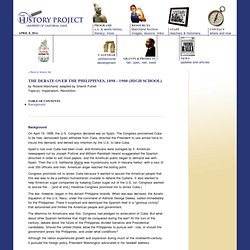
Congress declared war on Spain. The Congress proclaimed Cuba to be free, demanded Spain withdraw from Cuba, directed the President to use armed force to insure this demand, and denied any intention by the U.S. to take Cuba. Spain’s rule over Cuba had been cruel, and Americans were outraged by it. William Jennings Bryan - The Ideal Republic. William Jennings Bryan. William Jennings Bryan Imperialism (Flag of an Empire) delivered 8 August 1900, Indianapolis, IN Audio mp3 Excerpt Studio Reading of Address click for pdf click for flash Mr.
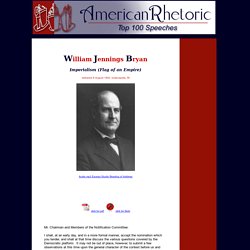
I shall, at an early day, and in a more formal manner, accept the nomination which you tender, and shall at that time discuss the various questions covered by the Democratic platform. Distant Possessions: The Parting of the Ways, by Andrew Carnegie. American Experience . America 1900 . The Film & More. The anti-imperialist movement in the United States in 1899 and 1900 was a movement that was arguing that the United States should get out of the Philippines, that if the United States stayed in the Philippines two things would happen.
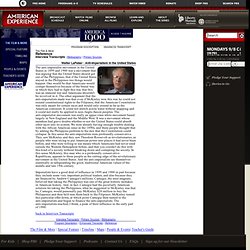
One would be that Americans would corrupt themselves because of the brutal way in which they had to fight this war, that this was an immoral war and Americans shouldn't be involved in it. The other argument that the anti-imperialists made was that even if McKinley won this war, he could not extend constitutional rights to the Filipinos, that the American Constitution was only meant for certain races and would only extend as far as the American continent.
It could not stretch across water without snapping and it could not really be applied to non-Anglo-Saxon peoples. The anti-imperialist movement was really an upper class white movement based largely in New England and the Middle West. Back to Interview Transcripts. The Age of American Imperialism. America and Imperialism: The Growth of Imperial Ideas Historian Paul Kennedy has called the emergence of the U.S. as player on world stage the most decisive change in late 19th century. America saw herself with a “special moral endowment” and felt justified in projecting influence beyond her borders. Americans still intended to avoid “entangling alliances” but felt free to get more actively involved in the affairs of the world. Imperialism. American Foreign Policy in the Late 19th Century: By Michael Chimes General: In the years leading up to the Spanish American War, the United States experienced a growth in ethnocentrism, a belief in manifest destiny and Anglo-Saxonism.
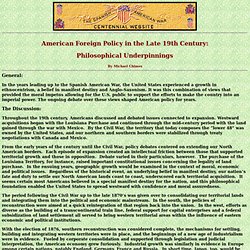
It was this combination of views that provided the moral impetus allowing for the U.S. public to support the efforts to make the country into an imperial power. The ongoing debate over these views shaped American policy for years. The Discussion: Throughout the 19th century, Americans discussed and debated issues connected to expansion. From the early years of the century until the Civil War, policy debates centered on extending our North American borders. The period following the Civil War up to the late 1870’s was given over to consolidating our territorial lands and integrating them into the political and economic mainstream. Americans took note of these events, and many thought we should pursue a foreign policy with similar goals.
Bibliography: The Philippines « United States Imperialism. Before the Philippines were even considered being annexed there were some debate on whether or not to annex them.
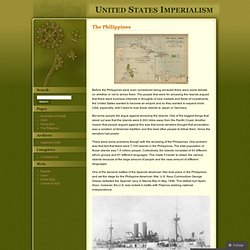
The people that were for annexing the islands argued that there were business interests in thoughts of new markets and fields of investments, the United States wanted to become an empire and so they wanted to expand more. USA, especially, didn’t want to lose these islands to Japan or Germany. Mark Twain on Imperialism - HistoryWiz primary source Imperialism. Mark Twain, The Greatest American Humorist, Returning Home, New York World [London, 10/6/1900] You ask me about what is called imperialism.
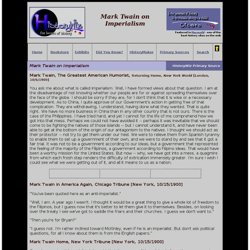
Well, I have formed views about that question. I am at the disadvantage of not knowing whether our people are for or against spreading themselves over the face of the globe. I should be sorry if they are, for I don't think that it is wise or a necessary development. As to China, I quite approve of our Government's action in getting free of that complication.
They are withdrawing, I understand, having done what they wanted. Mark Twain in America Again, Chicago Tribune [New York, 10/15/1900] "You've been quoted here as an anti-imperialist. " "Well, I am. "Then you're for Bryan? " "I guess not. Mark Twain Home, New York Tribune [New York, 10/15/1900] Internet History Sourcebooks.